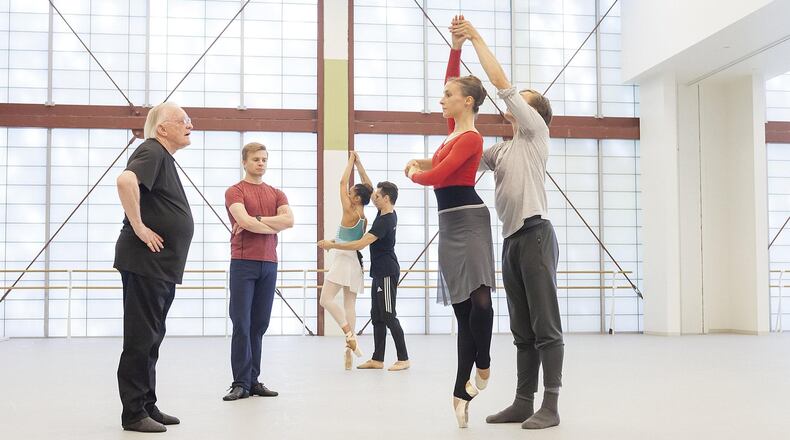Robert Barnett, artistic director emeritus of Atlanta Ballet, is finally seeing the company grow to a size that befits its place as the longest continuously operating American ballet company.
Barnett is rehearsing George Balanchine's "Tschaikovsky Pas de Deux" in Atlanta Ballet's newly expanded rehearsal studio, doubled in size to accommodate 12 new dancers across the main company and Atlanta Ballet 2 — 57 dancers, in total.
>> RELATED: Atlanta Ballet announces 2018-19 season, plans for more dancers
>> RELATED: Atlanta Ballet 2, a new training ensemble, will debut this fall
Translucent panels run the length of the exterior wall, where sunlight on foliage outside creates a dappled play of light and shadow, like abstract patterns on a Japanese shoji screen. The floor-to-ceiling windows are opaque, but Barnett’s memories of Balanchine’s style are, like Barnett’s blue eyes, crystal clear.
At 93, Barnett is doing what he loves best — teaching and coaching dancers. Having set Balanchine ballets on numerous companies in recent years, he is restaging work on Atlanta Ballet company members for the first time in 21 years for this weekend’s production, “Return to Fall.”
As Barnett stands facing a pair of dancers, hands on his hips, in blue shirt and blue jeans, white hair neatly combed back, it’s as if he never left.
Tchaikovsky’s music plays as Jessica He and Anderson Souza move through dizzying turns and gravity-defying jumps. Barnett calls out directions, emphasizing each downbeat with full-bodied impetus, then rebounding on each upbeat as if airborne. “It’s not calm, with a bunch of commas,” he later explained. “There are exclamation points all through it.”
The production marks not only Barnett’s return, but also the ballet’s first fall season main stage production in seven years — a necessary step, current Atlanta Ballet artistic director Gennadi Nedvigin said, to expand the company’s repertoire and its footprint on the city’s arts scene. The duet fits neatly into plans to build a repertoire of classical, neoclassical and contemporary ballets, Nedvigin said.
Barnett’s ties with Balanchine, one of the 20th century’s most influential ballet figures, help connect the next generation of dancers with Atlanta Ballet’s past as well as the history of American ballet.
Barnett joined New York City Ballet in 1949 and danced under Balanchine’s direction until he and his wife Virginia Rich Barnett relocated to Atlanta in 1958. Virginia had danced with the Atlanta Civic Ballet, which was leading the growth of American regional ballet under founder Dorothy Alexander’s direction.
When Alexander made Barnett the company’s second artistic director in 1962, Barnett recalled, his task became to turn a civic ballet, made up of mostly high school students, into a professional ballet company. It was no small feat.
He’d watched Balanchine’s leadership from the wings, and Barnett took his mentor’s approach to developing dancers. Raising enough money to support the vision, with a volunteer staff, proved more difficult.
“Atlanta is a very sports-minded town. They were not interested in the arts, so it was like pulling teeth.”
Balanchine supported AB’s fundraising efforts and gave his ballets free of charge. “Mr. Balanchine wrote me a letter,” said Barnett, “saying that I could set any of his works that I could remember.”
On a scaffold of Balanchine repertoire, the Atlanta Ballet grew to be a nationally recognized professional company, known for artistic excellence though smaller than its counterparts in Boston, Houston and a few other regional cities. AB was among the first to produce a full-length “Swan Lake” in the U.S. And even though the company experienced a rocky financial history during Barnett’s 32-year tenure, AB’s budget increased to more than $4 million by the early 1990s, Barnett said. He resigned in 1994, largely because the board’s proposed budget cuts would have thwarted his artistic vision while diminishing the organization’s integrity.
And despite consistently high artistic standards under his successor, John McFall, the company continued to experience financial ups and downs.
Enter Nedvigin, who plans to expand the company to a size comparable to other midsize American ballet companies. A three-year donation has made it possible, but whether the city can sustain a large, ranked company into the future remains to be seen.
Barnett is optimistic. He is pleased with Nedvigin’s ability to prepare dancers for diverse repertoire. “They’re well-rehearsed, well-trained, and they have a real style,” he said. “They are able to do anything.”
A larger staff has bolstered fundraising power, and Barnett cited larger donations and standing ovations as evidence that audiences like what they’re seeing.
“The company has learned. The board has learned,” Barnett said. “The city has to learn. They’re growing up.”
This weekend, “Tschaikovsky Pas de Deux” will pair with the Grand Pas de Deux from “Don Quixote” in a one-act divertissement. The company will also perform Jiri Kylian’s “Return to a Strange Land” and Ricardo Amarante’s “The Premiere” (a world premiere). As part of a new partnership, members of Czech National Ballet will present an excerpt from Mauro Bigonzetti’s “Vertigo.”
DANCE PREVIEW
“Return to Fall”
Presented by Atlanta Ballet. 8 p.m. Sept. 14-15; 2 p.m. Sept. 15-16. $25-$130. Cobb Energy Performing Arts Centre, 2800 Cobb Galleria Parkway, Atlanta. 1-800-982-2787, atlantaballet.com.
IN OTHER NEWS:
About the Author
Keep Reading
The Latest
Featured






